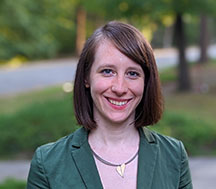Insa Lawler

Insa Lawler joined UNCG in 2019. She received her doctoral degree from the University of Duisburg-Essen in 2018 and her MA and BA degrees from Bielefeld University. She also spent time at the Ruhr University Bochum, the University of Salzburg, the University of Edinburgh, and NYU. Prof. Lawler's research focuses on the epistemology of scientific inquiry. She works on the nature of (answers to) why questions, knowing why, scientific understanding, scientific models and idealizations, progress in science, applied statistical reasoning, and measurement in cognitive science. Until 2022, Prof. Lawler is the Co-Investigator of the research project “Understanding Progress, in Science and Beyond”, which is generously funded by the Icelandic Research Fund. She is also a member of the Steering Committee of the Scientific Understanding and Representation (SURe) Workshop Series, and a member of the executive committee of the Society for Women in Philosophy (SWIP) Germany, where she co-runs a mentoring program for female philosophers. Prof. Lawler teaches on topics in logic, critical thinking, epistemology, philosophy of science, and philosophy of language. In 2019, she was awarded a teaching certificate for higher education teaching. More information can be found on her website (above).